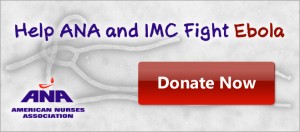 RNs play a critical role in assessing patients who have been exposed to or contracted Ebola.
RNs play a critical role in assessing patients who have been exposed to or contracted Ebola.
ONA is working with our affiliate organizations and healthcare agencies in mobilizing efforts to reduce the impact of this epidemic and protect our members and communities.
It is important for Registered Nurses to be well-informed on Ebola – understanding the symptoms, asking the right questions and knowing who to direct communication about possible cases is critical. It is also crucial that RNs know how to protect themselves from contracting Ebola while caring for patients.
Ebola Checklist for Health Care Workers
[one_half]
Announcements
11/10/14: HIPAA Privacy in Emergency Situations
10/18/14: Ohio’s Hospitals, Nurses and Physicians Work Together to Prepare for Ebola
Latest From the Ohio Department of Health & Board of Nursing
Ohio Board of Nursing Ebola Information
Information for Healthcare Workers
ANA Position Statement on Risk and Responsibility
Ebola Signs & Symptoms (CDC)
Symptoms of Ebola include
- Fever (greater than 38.6°C or 101.5°F)
- Severe headache
- Muscle pain
- Weakness
- Diarrhea
- Vomiting
- Abdominal (stomach) pain
- Unexplained hemorrhage (bleeding or bruising)
Symptoms may appear anywhere from 2 to 21 days after exposure to Ebola, but the average is 8 to 10 days.
Recovery from Ebola depends on good supportive clinical care and the patient’s immune response. People who recover from Ebola infection develop antibodies that last for at least 10 years.
Ohio Ebola News
[wp_rss_multi_importer category=”5″ hdsize=”18px] [/one_half] [one_half_last]Governor Kasich, Ohio Nurses Association Working Together to Ensure Safety, Preparedness
Nurses Association Applauds Governor’s Proactive Approach
COLUMBUS, Ohio – Governor Kasich spoke with registered nurse and ONA CEO, Lori Chovanak, early Tuesday evening over concerns regarding the preparedness of Ohio’s hospitals, nurses and healthcare workers if an Ebola outbreak were to occur in Ohio. Chovanak explained Ohio’s nurses are expressing great concern of Ebola preparedness and are requesting additional training, support, and resources. ONA requested that all healthcare facilities take three courses of action immediately:
1. Practice drills of the entire healthcare team regarding the scenario of a possible or confirmed Ebola case. The drill needs to include practice steps, including quick assessment and identification, proper isolation and appropriate notification of the health department for further direction.
2. Additional training including use and removal of appropriate persona protective equipment (PPE) for the care of an Ebola patient.
3. Measures to ensure proper supplies are available.
In response, Governor Kasich confirmed in conversation with ONA that both the Ohio Hospital Association and the Ohio Department of Health have been contacted, demanding healthcare facilities ensure these three courses of action are completed as soon as possible.
“I am very encouraged in our collaborative work with Governor Kasich. The governor is taking this issue seriously, as we all, especially as healthcare workers, must do. All nurses in the state need to ensure that the efforts of ONA and state officials are being carried out in their facilities,” stated Chovanak.
The recommended action items from the Ohio Nurses Association are a result of Ohio nurses voicing their concerns regarding training, preparation and communication from their employers. Many nurses who responded to a survey launched by ONA demanded a directive be given to their facility to begin practice drills, education and training. The nurses are eager to work with their healthcare facilities to maximize the preparedness to effectively care for an Ebola infected patient.
The Ohio Nurses Association will continue to proactively work with the governor’s office, other state offices and healthcare organizations to ensure all healthcare professionals are properly trained, informed, and supported.
“We understand how important this information is to nurses. We will continue to push as much information as possible to our members and others via social media, emails and our website, which hosts all of the latest Ebola information, resources and news. Nurses are the front line caregivers and we will continue to ensure optimal care for our patients no matter what challenges we face,” explained Chovanak.
The Ohio Nurses Association has over 9500 members and represents the voice of professional nurses in Ohio. ONA is affiliated with the American Nurses Association and American Federation of Teachers: Nurses and Health Professionals.
[/one_half_last]News, Video
10/18/14: Ohio proactive in fight against Ebola, Kasich says (Columbus Dispatch)
10/16/14: Ohio Nurses Prepare (WBNS Columbus)
Ohio nurses say hospitals unprepared for Ebola, health officials take action (Fox 19, Cleveland)
%CODE3%
Ohio’s Largest Nurses Association Concerned Over Hospital Preparation for Ebola (NewsNet 5)
10/15/14: Ohio Nurses Association on Ebola
%CODE4%
10/13/14: Ohio Nurses on Ebola (WBNS Columbus)
All media inquiries should be directed to:
Molly Ackley
Director of Communications
Ohio Nurses Association
614-448-1041 | mackley@ohnurses.org
Resources for Nurses
[one_half]This training video for health care Workers, from a demonstration conducted September 2014 in Halifax, Nova Scotia by Dr. Todd Hatchette, includes a demonstration of the appropriate donning and doffing of personal protective equipment for Ebola at around the 22 minute mark.
Ebola Training Video for Health Care WorkersOSHA
- Standards for Protecting Workers from the Ebola virus
- Control and Prevention of Ebola
- Medical Information
Fact Sheets
- AFT: Ebola Fact Sheet (PDF)
Webinar and Conference Call Recordings
- What U.S. Hospitals Can Learn From Emory Healthcare and Nebraska Medical Center Conference Call Recording: During this COCA Call, the presenters will focus on healthcare systems preparedness, and participants will learn how Emory Healthcare and Nebraska Medical Center prepared for patients with Ebola and the lessons learned.
For School Nurses
- AFT: Preparing for Ebola in Schools (PDF)
- NY Health: Guidance for Daycares and Schools: Receiving Students or Staff from Areas Affected by Ebola (PDF)
Volunteering
From The American Nurses Association (ANA)
- ANA Statement on Nurse Diagnosed With Ebola
- ANA’s Social Media Campaign Using #nursepreparedness
- AJN Article: Nurse Epidemiologist Puts Outbreak in Perspective Ebola (Word document)
- ANA Call to Action on Ebola (Word document)